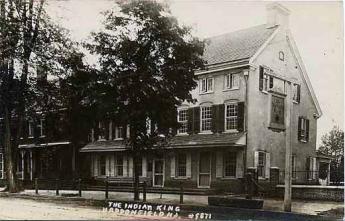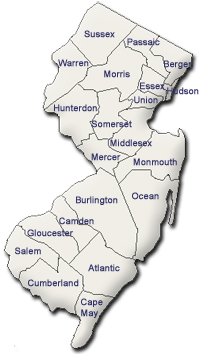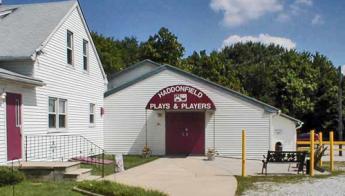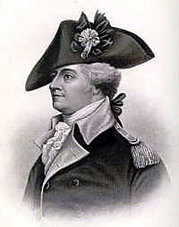Related Topics
Musical Philadelphia
Quakers never cared much for music, but the city has nonetheless musically flourished into international fame. At the same time, quarrels and internal battles have also been world class.
The British Attack Philadelphia
Fighting in the Revolutionary War lasted eight years; for two years (June 1776 to June 1778) Philadelphia was the main military objective of the British.
Bystanders to the Revolution
It wasn't heroic to everyone.
Haddonfield (all 26)(1 of1)volume 38
 Haddonfield is a bit of a secret. It's Philadelphia's "Main Line, East"
Haddonfield is a bit of a secret. It's Philadelphia's "Main Line, East"
Quakers: All Alike, All Different
Quaker doctrines emerge from the stories they tell about each other.
Revolutionary Philadelphia's Patriots
All kinds of people were patriots in 1776, and many of them were all mixed up about what was going on and how they stood. Hotheads in the London Coffee House stirred up about an inoffensive Tea Act, Scotch-Irish come here to escape the British Crown, the local artisan class and the local smuggler class, unexpectedly prospering under non-importation, and the local gentry -- offended to be denied seats in Parliament like other Englishmen. Pennsylvania wavered until Ben Franklin stepped forward with a plan.
Up the King's High Way
New Jersey has a narrow waistline, with New York harbor at one end, and Delaware Bay on the other. Traffic and history travelled the Kings Highway along this path between New York and Philadelphia.
New Jersey (State of)
 The Garden State really has two different states of mind. The motto is Liberty and Prosperity.
The Garden State really has two different states of mind. The motto is Liberty and Prosperity.
Pacifist Pennsylvania, Invaded Many Times
Pennsylvania was founded as a pacifist utopia, and currently regards itself as protected by vast oceans. But Pennsylvania has been seriously invaded at least six times.
Quaker Peace Testimony
New topic 2016-12-04 04:05:49 description
The King's Road

|
| Plays and Players of Haddonfield |
Harry Kaufman may not have started the Plays and Players of Haddonfield, but he certainly sparked it to a near-professional level in a town of 7000 people. The orchestra and the ballet company are particularly outstanding at the moment, the soloists on the stage quite good, although they never made the grand European tour which is thought to be the prerequisite for getting into the big time. Harry was the life of any party, and particularly good at composing little ditties, never quite getting around to stringing them together into a musical comedy until the 250th anniversary of the town. Even then, it is recalled he was shy and reluctant and had to be pushed a little. Since The King's Road appeared shortly after Oklahoma! transformed, even revolutionized, American musical comedy, it was not only the model but the stimulus for a similar comedy celebrating the beginnings of our little state. The plot was a simple one of a conflicted love affair. The striking innovation of Oklahoma! was to crowd most of the show's songs into the first act, repeating snatches of their themes as sort of Wagnerian background commentary throughout the remainder of the play. The other innovation of what was originally called Green Grow the Lilacs was the addition of Agnes DeMille's ballet company to emphasize the real historical theme with light-hearted music. Since I was one of the original reviewers for Oklahoma! in its New Haven tryouts, I can remember the revolutionary impact of that play, very well.

|
| Anthony Wayne |
Harry had to go to the Historical Society for authentic details of the conflict between the attraction for Revolutionary aspirations for Liberty, and loyalty to the earlier sufferings of Quakers for their pacifist leanings. Some Quakers deserted their faith to join the Revolution, and other Quakers tried to convert the Hessian soldiers. And still, others were loyal to the King of England. The Revolution was almost won at this moment, as the British occupants of Philadelphia had abandoned their supplies to attack, and had to get to the British fleet, bottled up in the lower Delaware River by fortifications at Fort Mifflin and Fort Mercer on the Jersey side of the river. The Hessians had been sent to attack Fort Mercer from the rear, passing through Haddonfield and stopping one night before going on to what we now call National Park. While the Hessian officers were being entertained by John Gill with discussions of the futility of war, Jonas Cattell slipped out of town and ran to alert Fort Mercer of its danger. The guns of the Fort were turned around, and the defenders pretended not to notice the approach of the Hessians until they were ambushed and largely destroyed. If Fort Mifflin on the Pennsylvania side of the Delaware River could have held out, the starving British might have had to surrender, but that didn't happen. In any event, the New Jersey Militia did its part, and little Quaker Haddonfield helped them in a sort of characteristic Quaker way. With a ratta-tat-tat and a fiddly dee, the rag-tag swallow-tail Jersey Militia got all the credit.
The play does not emphasize that the State of New Jersey was founded at the Indian King Tavern during these commotions, or that General Washington starving at Valley Forge sent Mad Anthony Wayne to circle up and around Trenton to drive a herd of cattle back from Salem County, two hundred miles back to Valley Forge. The British sent Captain Simcoe down to Salem County to massacre the Quaker farmers who provided the cattle. These later developments are only mentioned in its anthem to "Generals Wayne, LaFayette, and Pulaski", and every good resident of Southern New Jersey is supposed to know what that is all about.
The Quaker historian Rufus Jones established the enduring tradition that this split is what ultimately reduced the Quakers from the dominant religious group to a small religious sect in the three states once owned by William Penn, Delaware, Pennsylvania, and New Jersey. Related to such turmoil was the claim that more battles of the Revolution were fought in New Jersey than in any other state; if you include the large privateer navy going to see from the Jersey Pine Barrens, that is probably true. And every twenty-five years or so, we have to put on a revival of "The King's Road", and just show 'em.
Originally published: Wednesday, October 16, 2013; most-recently modified: Friday, May 31, 2019